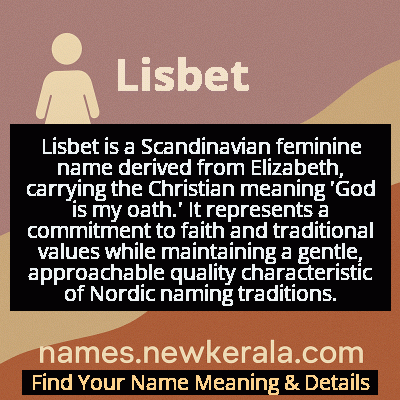Lisbet Name Meaning & Details
Origin, Popularity, Numerology Analysis & Name Meaning of Lisbet
Discover the origin, meaning, and cultural significance of the name LISBET. Delve into its historical roots and explore the lasting impact it has had on communities and traditions.
Name
Lisbet
Gender
Female
Origin
Christian
Lucky Number
4
Meaning of the Name - Lisbet
Lisbet is a Scandinavian feminine name derived from Elizabeth, carrying the Christian meaning 'God is my oath.' It represents a commitment to faith and traditional values while maintaining a gentle, approachable quality characteristic of Nordic naming traditions.
Lisbet - Complete Numerology Analysis
Your Numerology Number
Based on Pythagorean Numerology System
Ruling Planet
Uranus (Rahu)
Positive Nature
Strong sense of order, loyal, practical, and disciplined.
Negative Traits
Stubborn, overly serious, rigid, and prone to feeling restricted.
Lucky Colours
Blue, gray.
Lucky Days
Saturday.
Lucky Stones
Blue sapphire.
Harmony Numbers
1, 7, 8.
Best Suited Professions
Managers, engineers, accountants, organizers.
What People Like About You
Dependability, discipline, practicality.
Famous People Named Lisbet
Lisbet Palme
Psychologist and humanitarian
Swedish child psychologist, widow of Prime Minister Olof Palme, and former Chair of UNICEF
Lisbet Rausing
Historian and philanthropist
Swedish historian, academic, and major benefactor of scientific and historical research
Lisbet Koerner
Historian of science
Professor at Harvard University specializing in history of science and environmental history
Name Variations & International Equivalents
Click on blue names to explore their detailed meanings. Gray names with will be available soon.
Cultural & Historical Significance
Its usage reflects the Scandinavian preference for softened, melodic versions of biblical names while preserving their religious heritage. The name gained international recognition through Scandinavian literature and immigration patterns, though it remains most strongly identified with Nordic cultural identity. In modern times, Lisbet represents a connection to Scandinavian heritage while maintaining its Christian roots, serving as a bridge between traditional values and contemporary life.
Extended Personality Analysis
Individuals named Lisbet are often perceived as thoughtful, reliable, and deeply principled, reflecting the name's meaning of being 'consecrated to God.' They typically exhibit a quiet strength and determination, combined with practical wisdom that makes them excellent problem-solvers and trusted advisors. Lisbets are known for their loyalty in relationships and their ability to maintain traditions while adapting to modern circumstances.
Their Scandinavian roots often manifest in a love for nature, simplicity, and functional beauty. While they may appear reserved initially, Lisbets possess warm, engaging personalities that emerge in comfortable settings. They value honesty and integrity above all else, and their word, once given, is considered unbreakable. This combination of steadfastness and gentle warmth makes them cherished friends and family members who provide stability and wisdom to their communities.
Modern Usage & Popularity
In contemporary times, Lisbet maintains moderate popularity in Scandinavian countries, particularly in Sweden and Norway where it's considered a classic rather than trendy name. While it never reached the peak popularity of its parent name Elizabeth, it has experienced a gentle resurgence among parents seeking traditional Scandinavian names with religious heritage. The name is uncommon in English-speaking countries but occasionally appears in communities with Nordic heritage. Modern usage trends show Lisbet being chosen by parents who value cultural authenticity and understated elegance over flashy or invented names.
Symbolic & Spiritual Meanings
Symbolically, Lisbet represents faithfulness, tradition, and quiet strength. The name's connection to the oath 'God is my oath' gives it connotations of commitment, reliability, and spiritual dedication. In metaphorical terms, Lisbet symbolizes the bridge between ancient traditions and modern practicality—maintaining core values while adapting to contemporary life. The name evokes images of Scandinavian landscapes: clean, strong, and enduring, yet possessing a subtle beauty that reveals itself gradually. It represents the idea that true strength often lies in quiet consistency rather than loud proclamation.

